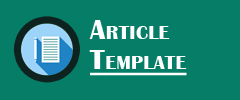The Influence of The Scientific Learning Approach Assisted by Froggy Jumps on The Indonesia Language Learning Outcomes of Grade IV Elementary School Students
DOI:
https://doi.org/10.56806/jh.v6i2.232Keywords:
Froggy Jumps, Learning Outcomes, Scientific Learning ApproachAbstract
The purpose of this study was “to determine the influence of the Scientific Learning Approach assisted by Froggy Jumps on the learning outcomes of Indonesian language of grade IV students of SD Negeri 09 Makarti Jaya”. The methode used in this study was Pre-experimental with a One-Group Pretest-Posttest design. The population and sample of this study were all grade IV students at SD Negeri 09 Makarti Jaya with a total of 17 students. The data collection was carried out using tests in the form of Pretest and Posttest. The result showed that the average result of the initial Pretest test score 50.35 and the average result of the final Posttest test score 86.70. The result of the hypothesis test showed a t count value 3.303 and a t table value of 2.131 (t count > t table) so that Ho was rejected and Ha was accepted. It can be concluded that there is an influence of the Scientific Learning Approach assisted by Froggy Jumps on the learning outcomes of Indonesian language of grade IV students of SD Negeri 09 Makarti Jaya.
Downloads
References
Ali, M. (2020). Learning Indonesian Language and Literature (Basastra) in Elementary Schools. PAUD Journal, 3 (1), 35-36.
Amirudin, Nurlaeli, A., & Amar Muzaki, Iv. (2020). The Influence of Reward and Punishment Methods on Student Learning Outcomes in the Field of Islamic Religious Education (Case Study at SDIT Tahfizh Qur'an Al-Jabar Karawang). TARBAWY: Indonesian Journal of Islamic Education, 7 (2), 140-142.
Arif Setivawan, et al (2020). Improving student activeness in Indonesian Language Subjects by using a scientific approach in lesson study activities. Learning Innovation Journal. 6 (2), 164-177.
Batitusta, F, O & Hardinata, V. (2024). The Effect of Implementing the Gadget-Based Educaplay Educational Game Mediva on Essay Writing Learning Outcomes. Scientific Journal of Educational Sciences. 7 (3), 385-390.
Ermawati, D., & Amaliva, N. (2023). The Effect of Mat Joyo Application on Students' Understanding of Mathematical Concepts in Grade. Journal of Education and Counseling. 9 (1), 12–22.
I Gede Ricky, et al. (2021). The Use of Scientific Approaches in Improving Indonesian Language Learning Outcomes.
Journal of Educational Research and Development. 5 (2), 242-249.
Mulyasa, Independent Learning Teacher. Education and Teaching Review Journal. 7 (2), 77-84.
Muzdalifah, A., Arafat, Y., & Selegi, S. F. (2023). The Influence of Project Based Learning Model Based on Ethnoscience on SBDP Learning Outcomes at Muhammadiyah Elementary School Prabumulih. Scientia: Journal of Research Results, 8 (1), 37-46.
Nasir, R. (2017). Application of Scientific Approach to Improve. Journal of Educational Sciences. 5 (2), 356–363.
Ni Putu A. (2019). The Effect of Scientific Approaches with Audio Visual Media on Writing Skills in Indonesian Language Learning. Scientific Journal of Teacher Professional Education. 2 (1), 91-100.
Sabagestra, D. P., Rif’at, M., & Munaldus, M. (2022). Analysis of Student Errors in Solving Decimal Subtraction Arithmetic Operation Problems in Students at Junior High Schools in Pontianak. Equatorial Journal of Education and Learning (JPPK), 11 (3), 1–8.
Siliva Citra Linda and Hadiyanto. (2019). Increasing Activity and Learning Outcomes of Natural Phenomena Material Through the Scientific Approach of the Discovery Learning Model Group Discussion Method in Class VI of Elementary School 54 Payakumbuh. Basicedu Journal, 3 (2), 524– 532.
Sugiyono. (2024). Quantitative Research Methods. PT. Alfabeta. Bandung
Tri, R. G., Arafat, Y., & Selegi, S. F. (2025). The Influence of Digital Literacy Using Innovative Learning Methods Based on Mind Mapping in Indonesian Language Lessons. COLLASE Journal. 8 (2), 239-247.
Downloads
Published
How to Cite
Issue
Section
License
Copyright (c) 2025 Anna Nur Aswina, Yasir Arafat, Susanti Faipri Selegi

This work is licensed under a Creative Commons Attribution 4.0 International License.


























